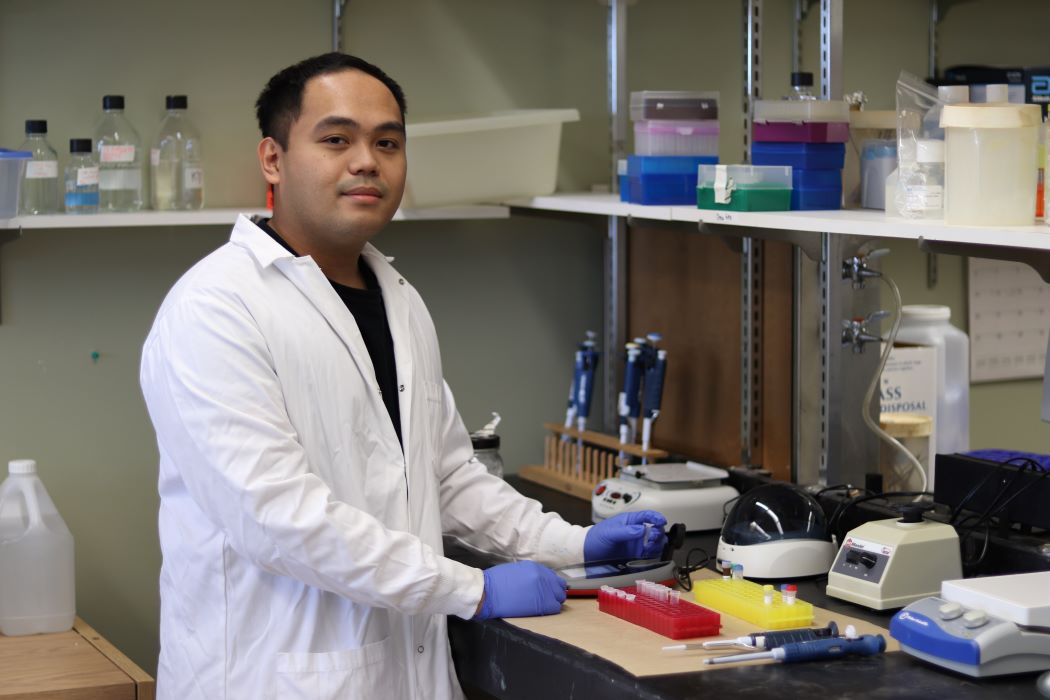
Rady grad student profile: Erwin Taguiam studies gene expression in tuberculosis and HIV co-infection
People living with HIV are at high risk for tuberculosis (TB).
In fact, in 2021, TB was the leading cause of death worldwide among people diagnosed with HIV.
“Studies have shown that HIV and tuberculosis reinforce each other,” says Erwin Taguiam, a 25-year-old master’s student in medical microbiology and infectious diseases at the Max Rady College of Medicine.
“But we still don’t have the full picture of why it’s so common to see both infections in the same person.”
Taguiam’s research focuses on searching for a “signature” in blood that could potentially be used to quickly and easily detect TB in people living with HIV.
“This is relevant in Manitoba because we have one of the highest rates of TB prevalence in Canada, with immigrant and Indigenous populations being the most affected,” he says.
We recently spoke with Taguiam about his research.
Tell us about your background and what brought you to this work.
I grew up in the Philippines. When I was 14, my family moved to Winnipeg and I went to West Kildonan Collegiate. Then I started a bachelor of science in biochemistry on the UM Fort Garry campus.
In my first few years of undergrad, I was really struggling. My grades weren’t the best. Then I heard about the UM co-op program, where you get to do a summer co-op work term with a professor. That’s how I met Dr. Deborah Court in the microbiology department. She saw my potential. She’s been a great mentor and basically led me to a career in research. I still talk to her for advice.
From that summer on, my perspective changed. My grades went up, and at the end of my bachelor’s in 2021, I was on the Dean’s Honour List. For my master’s, what I really wanted from a supervisor was the mentorship aspect. Dr. Zulma Rueda [Canada Research Chair in sexually transmitted infection – resistance and control] has been a great mentor, and so has my co-supervisor, Dr. Yoav Keynan [head of the section of infectious diseases in the department of internal medicine].
You received funding of $12,000 from Research Manitoba for your master’s research. How would you explain what you’re studying?
Many people with both HIV and TB infection don’t show the four clinical symptoms of TB: coughing, night sweats, weight loss and fever. Because they don’t present with those symptoms, they are often not tested for TB, so they don’t receive treatment.
Dr. Rueda, who is from Colombia, recruited study participants in hospitals and male prisons in Colombia. We’re studying cells isolated from their blood samples. We’re comparing four cohorts: people with both TB and HIV, people with only one of the two infections (HIV alone or TB alone), and a healthy cohort.
I’m hoping to identify what specific combination of genes gets over- and under-expressed in people with both tuberculosis and HIV – a unique signature for this co-infection. At the same time, I’m looking for a protein signature. Other researchers have studied this, but the results have not been reproducible.
The dream is that this will one day lead to a rapid point-of-care test kit, similar to COVID-19 test kits. People living with HIV could be easily screened for tuberculosis by having their thumb pricked and their blood tested for this signature. Test kits could be accessible everywhere, like in countries in Africa and Asia. Of course, my research is still far away from that. At the moment, I’m only laying the foundation.
What are your plans for the future?
My goal is to have a career in health research and maybe do a PhD. The other day, Dr. Keynan mentioned that a career in research sometimes gets frustrating. He said to remind yourself that you’re doing this to help people, and your contribution to research actually means something.
When I get tired, I remind myself that this work could be the foundation for tuberculosis screening or diagnostic testing. That makes me more motivated.
This Q&A is part of a series on UM Today this summer featuring Rady Faculty of Health Sciences graduate students. You can find more grad student profiles here: #Radygradstudents






